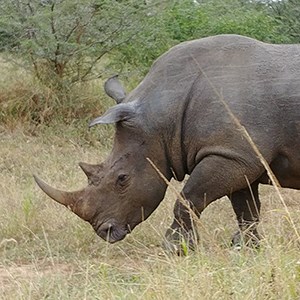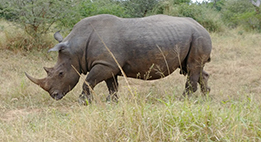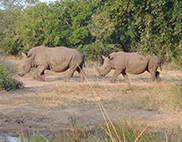How the loss of megaherbivores may allow carnivores to change the world

What happens to nutrients in a world without giants? A study recently published in Current Biology, as part of a collaborative research program between SLU and Nelson Mandela University, South Africa, experimentally shows how megaherbivores like rhinos and elephants move nutrients in opposite directions to vulnerable prey species that are responding to their fear of carnivores.
In the savannas of Africa herbivore prey face a constant threat of becoming a predator's next meal. In their attempts to avoid this fate, prey position themselves within a "landscape of fear", avoiding areas where a lion may be lurking and congregating in clearings where they can see the danger coming. By making their prey huddle for safety, predators indirectly cause them to concentrate faecal nutrients. Megaherbivores on the other hand are reasonably protected from predation by their large size. The researchers showed that megaherbivores feed within these areas of relative safety but defecate widely and evenly across the "landscape of fear", thereby redistributing these nutrients to the surrounding landscape.
This study reveals the intricate ways in which species interactions can influence the fate of nutrients. But it also raises interesting questions with regard to how the many predator population recovery programs currently underway across many parts of the world may affect nutrient distribution. Especially in light of the fact that every continent apart from Antarctica had once had several species of megaherbivores, yet today these giants are no longer around to fulfil their role in nutrient distribution.
"If the current rates of poaching of the few remaining megaherbivore species are left unchecked, this crucial ecosystem service may soon be lost to the world", says first author Dr. Elizabeth le Roux, who is postdoc with Nelson Mandela University working within a larger research program, led by Associate Prof. Joris Cromsigt of SLU, which looks at the consequences of the rhino poaching crisis in South Africa.
More information
Joris Cromsigt, Associate Professor
Department of Wildlife, Fish and Environmental Studies
Swedish University of Agricultural Sciences, Umeå, Sweden
+46 (0)70-676 00 97, joris.cromsigt@slu.se
Elizabeth le Roux, Postdoc
Centre for African Conservation Ecology, Department of Zoology, Nelson Mandela University, Port Elizabeth, South Africa
elizabeth.liza.le.roux@gmail.com
Article
Elizabeth le Roux, Graham I.H. Kerley, Joris P.G.M. Cromsigt. 2018. Megaherbivores Modify Trophic Cascades Triggered by Fear of Predation in an African Savanna Ecosystem. Current Biology 28, 1–7
https://doi.org/10.1016/j.cub.2018.05.088
Press images
(May be published without charge in articles about this press release, please acknowledge the photographer)
Rhino. Photo: Elizabeth le Roux
Rhinos. Photo: Murray le Roux

